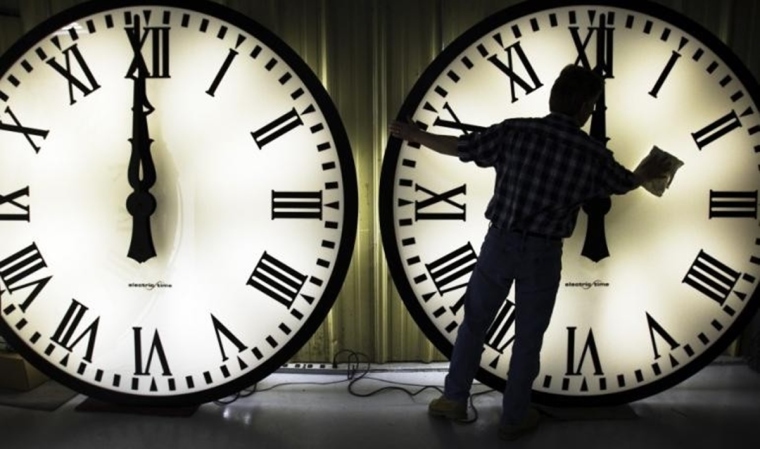When Does Daylight Savings Time End? Clocks Go Back an Hour on Nov. 2
At 2 a.m. Sunday, Nov. 2, all clocks in most parts of the United States will be turned back by one hour, or to 1 a.m., to mark the end of Daylight Saving Time this year. This will result in an additional hour of light in the morning and an earlier sunset.

Often called the "fall back," the change brings confusion and stress to some people. But we cannot do anything about it since it is a law enacted by the U.S. Congress in the Energy Policy Act of 2005.
Moreover, we can take comfort in the extra hour of sleep we will be getting after turning back the clock.
On March 8, 2015, daylight-saving time begins again, with the clocks moved an hour ahead.
Not all places are forced to adjust their clocks twice a year. For instance, Hawaii and most of Arizona don't observe daylight-saving time.
No need to worry about your smartphones and other mobile devices since they will update the time change automatically.
However, if you happen to live in places where daylight savings time is observed, you will need to manually change your traditional watches, clocks and other non-Internet enabled devices, like stoves and microwaves.
Daylight savings time is primarily meant to reduce national energy consumption. In a study conducted by the US Department of Energy involving 67 electric utilities, a savings of about 0.5 percent per day, or 1.3 trillion watt hours, was registered following the clock change. This may sound small, but when put together for a longer period of time, the total energy savings is quite enormous.
However, in a report from The Inquisitr, other studies found out that daylight saving time can actually be unhealthy. According to the report, the studies found out that students suffer from a lack of studying focus while workers end up wasting time in their jobs. A notable increase in traffic accidents, heart attacks, and even suicide risk were also recorded as a result of the time shift, the studies showed.
In separate statements, Utah State Rep. Lee Perry (R) and Sen. Aaron Osmond (R) called for an end to daylight saving time. They said that aside from Utah, at least four other states -- Colorado, Idaho, Montana and Wyoming -- are also planning to end the practice.
 Christians don't have to affirm transgenderism, but they can’t express that view at work: tribunal
Christians don't have to affirm transgenderism, but they can’t express that view at work: tribunal Archaeology discovery: Medieval Christian prayer beads found on Holy Island
Archaeology discovery: Medieval Christian prayer beads found on Holy Island Presbyterian Church in America votes to leave National Association of Evangelicals
Presbyterian Church in America votes to leave National Association of Evangelicals Over 50 killed in 'vile and satanic' attack at Nigerian church on Pentecost Sunday
Over 50 killed in 'vile and satanic' attack at Nigerian church on Pentecost Sunday Ukrainian Orthodox Church severs ties with Moscow over Patriarch Kirill's support for Putin's war
Ukrainian Orthodox Church severs ties with Moscow over Patriarch Kirill's support for Putin's war Islamic State kills 20 Nigerian Christians as revenge for US airstrike
Islamic State kills 20 Nigerian Christians as revenge for US airstrike Man who served 33 years in prison for murder leads inmates to Christ
Man who served 33 years in prison for murder leads inmates to Christ


 Nigerian student beaten to death, body burned over ‘blasphemous’ WhatsApp message
Nigerian student beaten to death, body burned over ‘blasphemous’ WhatsApp message 'A new low': World reacts after Hong Kong arrests 90-year-old Cardinal Joseph Zen
'A new low': World reacts after Hong Kong arrests 90-year-old Cardinal Joseph Zen Iran sentences Christian man to 10 years in prison for hosting house church worship gathering
Iran sentences Christian man to 10 years in prison for hosting house church worship gathering French Guyana: Pastor shot dead, church set on fire after meeting delegation of Evangelicals
French Guyana: Pastor shot dead, church set on fire after meeting delegation of Evangelicals ‘Talking Jesus’ report finds only 6% of UK adults identify as practicing Christians
‘Talking Jesus’ report finds only 6% of UK adults identify as practicing Christians Mission Eurasia ministry center blown up in Ukraine, hundreds of Bibles destroyed: 'God will provide'
Mission Eurasia ministry center blown up in Ukraine, hundreds of Bibles destroyed: 'God will provide' Church holds service for first time after ISIS desecrated it 8 years ago
Church holds service for first time after ISIS desecrated it 8 years ago Burger King apologizes for 'offensive campaign' using Jesus' words at the Last Supper
Burger King apologizes for 'offensive campaign' using Jesus' words at the Last Supper Uganda: Muslims abduct teacher, burn him inside mosque for praying in Christ’s name
Uganda: Muslims abduct teacher, burn him inside mosque for praying in Christ’s name